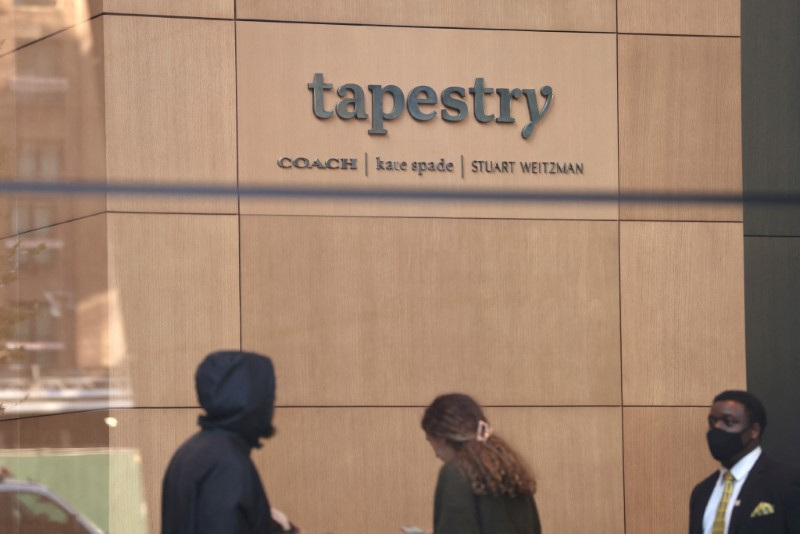By Siddharth Cavale
NEW YORK (Reuters) - A U.S. judge blocked the pending $8.5 billion merger of U.S. handbag and accessories maker Tapestry (NYSE:TPR) and Capri on Thursday, a victory for the Federal Trade Commission that is a likely death blow for the deal.
The decision is a win for the Biden administration ahead of the Nov. 5 presidential election, in which rising consumer prices have become a top concern for voters.
The FTC argued at an eight-day trial in New York that the merger would eliminate fierce head-to-head competition between the top two U.S. handbag makers and create a massive company with the power to unfairly raise prices.
The ruling sent Capri shares tumbling by 47%, and Tapestry shares up by around 13% in after-market trading.
U.S. District Judge Jennifer Rochon rejected the companies' defense of the deal, including their argument that handbags are nonessential items whose price consumers can control by not buying them if they become too expensive.
That argument "ignores that handbags are important to many women, not only to express themselves through fashion but to aid in their daily lives," the judge said.
Tapestry said it believes the ruling is incorrect and plans to appeal.
"We face competitive pressures from both lower- and higher-priced products and continue to believe this transaction is pro-competitive and pro-consumer," the company said in a statement.
Henry Liu, director of the FTC’s Bureau of Competition, called the decision "a victory not only for the FTC, but also for consumers across the country seeking access to quality handbags at affordable prices."
A spokesperson for Capri did not immediately respond to a request for comment.
The deal would have brought six brands under one roof: Tapestry's Coach , Kate Spade and Stuart Weitzman; and Capri's Versace, Jimmy Choo and Michael Kors.
Tapestry argued at trial that the deal was spurred by an intensely competitive U.S. handbag industry and was needed to fight back against European players like Gucci, which are increasing market share.
The ruling in effect permanently blocks the proposed deal, Tapestry's lawyers said in court documents, because it would require the deal to pass another lengthy review by the FTC which would stretch past the deal's termination date of Feb. 10.
Rochon said in her ruling that the companies are free to defend the deal before the FTC and are not required by their agreement to abandon it if it does not close.
There is scant precedent for merger challenges in the fashion industry, which tends to be too fragmented and competitive to foster traditional monopolies.
Tapestry and Capri had also argued that reviving the Michael Kors brand, investing in all Capri brands using Tapestry's greater resources and selling more handbags would increase competition in the industry, rather than reduce it.
Rochon rejected that argument on Thursday, saying the companies had not shown that Capri is unable to reinvigorate the brand on its own and that harm to competition in accessible luxury handbags outweighs the benefits.
Tapestry and Capri had argued accessible or affordable luxury was not a well-defined category in the industry, but Rochon said the companies' own documents showed the terms were used frequently.

Various factors including price, materials and manufacturing locations differentiate affordable luxury handbags from their luxury and mass-market cousins, the judge wrote.
The ruling follows approval of the merger by regulators in Japan and the European Union earlier this year.